When Nussy Andrews tells me she’s an open book, I believe her. On her stellar 2024 album, VENUS, BABY, the New York City-based, New Jersey-raised singer-songwriter is morosely honest. “Autopsy,” the record’s soul-stirring opening track, finds her musing on the puzzled faces of medical examiners who will have to pour over her corpse one day. Haunted by the ghostly presences of legendary trans performers of the past, the record is as gorgeous as it is devastating and mortifying. Almost exactly a year after the album’s release, I caught up with Andrews for her first-ever published print interview.
I really like the doodles and the illustrations that you do alongside your music—one of them ended up being the cover for the most recent album VENUS, BABY. Did music or drawing come first for you?
Nussy Andrews: Definitely music came first for me. I was just talking to my mom about this: she said that I was speaking full sentences at nine months, which was pretty odd, and then I was singing at, like, a year. I was making weird noises, so music was always there. But then doodling, I think every kid doodles. It only really became a hobby for me a couple years ago; I started doing it more frequently. This idea of dead time, you’re waiting on the subway or for the train to come, and what do I do with that time? Instead of going on my phone, I would carry around a sketchbook and doodle. So doing that over the course of a couple years, I’ve just kind of learned to do it a lot and gotten kind of good at it, I guess.
Going off the topic of musicality from a young age, do you have a background in stage performance at all? I feel like your vocal presence is very theatrical throughout your stuff.
NA: It’s funny, because I did musical theater as a kid and they always told me to sing it less weirdly. I’ve always sang the way I sang, and when I did musical theater as a kid, there was a very specific type of way they wanted kids to sing. I see people talk about this now, like, the “BFA belt” or whatever. But I liked jazz standards a lot. I liked Billie Holiday, I liked Nina Simone—I wanted to sing like them, so I was singing in that kind of way, and I would get a lot of flack doing theater for that. I think I learned kind of how to do [a] theatrical [voice], but now I do a weird in-between of both, maybe.
I feel like your songwriting and arrangement style is so historically, quintessentially New York to me. It’s very heart-rending and dramatic, but very intimate. How do you think New York City and the musicians in it have shaped you as an artist?
NA: It’s weird. I’ve been in the city for a while and I’ve seen a lot of scenes kind of matriculate in and out of it. I’ve always just done what I do, which I think, as long as I’ve been here and as long as I’ve been doing music, there hasn’t really been a scene for it quite yet—but there was a scene for it, like, a couple decades ago. You know, the Regina Spektor era, there [were] a lot of people similar to me. People locally who inspire me, it’s interesting, ‘cause they inspire me but they don’t really do what I do—like my friend Comet, who’s a very talented grunge artist. When she first moved to the city, I helped her move in because I wanted to be her friend so bad. She’s been such a guiding force for me, as a trans woman in the music industry. I had a lot of self-doubt at the time, the way that she goes about doing music and the way that she takes her craft so seriously and takes herself so seriously was, like, so cool to me. And we do very different music—musically, the inspiration is not there, but energetically it is. I don’t know, musically I feel like I pull from something that’s not quite here anymore.
Speaking of which, I see your stuff get likened to Fiona Apple a lot, especially her earlier work. What do you make of those comparisons, how have you felt about them throughout the years?
NA: Okay. First and foremost, I love Fiona Apple. I have IDLER WHEEL [on my wall]. It’s funny, because I started writing music before I even knew who she was. I think people have this conception of me that I started writing to be like her, but it really was the opposite. I think we like a lot of the same people—she has a jazz influence that becomes alternative, and I have the same thing. I was already writing music, and then when I found her I was like, “Oh, people do what I want to do, people can make this type of music.” I’m excited by the comparison, because it’s, like, “Oh cool, that thing I’m trying to do is translating well.”
However, I get it so often to the point where I’m not offended, I’m more just afraid—I’m, like, do people think I’m just ripping her off blatantly? I have a lot of different influences. Fiona Apple is definitely one of them, but I probably have a list of a hundred. I don’t know, I feel like I’ve shied away from any comparison—that’s, like, a tricky topic for me. Sometimes I’ve played stuff to people and they go, “Oh, that sounds exactly like Fiona Apple.” And I’m like, “Fuck, I have to find some new way to do it.” I don’t wanna be just doing what someone else did, I wanna do what I do and make it very me.
Getting into your more recent work, VENUS, BABY is dedicated to and written in memoriam of two legendary trans performers, those being Venus Xtravaganza and Candy Darling. What significance do those figures hold to you, and how did their stories and voices manifest in this album? They’re very present, at least to me.
NA: Definitely them, and also I would say Greer Lankton. Greer is a huge influence [on] me artistically, with my fine art and stuff. Her journal, oh my god. And also Holly Woodlawn, and
Sylvie Rivera, and Jackie Curtis I do mention in the album in very subtle ways. Maybe they don’t even translate to people, but they’re there. I had a poster of Candy in my room, she was probably the first trans woman I was like, “Woah, oh my god, I need to do this.” There was Caitlyn Jenner and Laverne Cox at that time—[I] love Laverne. Caitlyn Jenner … complicated feelings there. But Candy, I was like, “Oh yeah. She’s a New York girl, and she’s fuckin’ messy.” I was just in a season of my life where I really latched onto her. I think when I started writing it, I was two years on hormones or something, and was just really obsessed with her as a person—and I was drawing her a lot, which is why the cover became that.
This is a bit of an over-share, but it just is the situation. I’m in recovery [from] drug addiction, and the last song on the album, “Venus, Baby,” I wrote right before I checked myself into rehab. It was because I had a spiritual experience of sorts, where I was coming down from a couple drugs and on a couple other drugs—it was just a weird Venn diagram of being high in a couple different ways. I was lying on my floor, and I hadn’t eaten in a couple days either. I could just kinda sense I was going to die, maybe. My heart felt like it was slowing, my mouth felt very dry and I had to get water but I couldn’t stand up or move my arms. Then my arms started to hurt, my chest started to hurt, and I was like, “Oh God, a heart attack is happening.” But then I saw a portal open with Venus Xtravaganza coming down to try to hand me a torch, and I was moving my arm to grab it. It didn’t exist, so I couldn’t grab it, obviously—but I realized doing that, I was moving my arm. Someone came up to me after I told [this story] once and told me they’re a doctor, and they were like, “Moving your arm like that to grab that torch got circulation moving in your body that probably kept you alive.” So in a weird way, that weird vision kinda saved my life. She became a guiding figure for me for that reason, I would pray to her and stuff—I wrote that song for her. Transcestry is very important to me.
A little bit of a darker question, but both of those women passed before they could turn 30. I feel like there’s a lingering sense of doom and mortality that underscores a lot of this record, and it’s almost painted as being intrinsic in a life lived as a trans woman. How did you try and approach those topics while making those songs?
NA: I mean, trans death is so politicized. It’s kind of a horrifying thought I have where it’s, like, even after you die, it’s just a political thing whether you want it to be or not—and trans life is political too. I kind of didn’t think I’d make it out of the period [when] I was writing this album. I relapsed on drugs, I was in these bad relationships, I was not eating, it was just bad. There were just so many forces that I thought would take me out, and I spent a lot of time thinking about dying and what it’d be like when I died. It really wasn’t a question of would I die, it was when. I’m really grateful I didn’t, and that now I don’t think I’m gonna die—I hope I make it past 30, I think I will. I don’t think it’ll be my own doing, I know that much. I don’t know, I didn’t mean to sit down and think, like, “I’m gonna write a bunch of songs about death.” I realized every song was something about dying or death. I think that’s just where my head was at at the time.
I think that’s the hope of this album, the trans women that I kind of looked towards while writing it—because the final song is an encapsulation of that: They didn’t get to make it past 30 so that I could. Like, Venus is trying to pass something to me. I don’t know what it was, but I was trying to grab at it. I feel like that was legacy, or hope, or just a couple more years. Maybe it’s just an ancestral line of, “I hope the next kid after me gets a couple more years than I do.”
I think the opener, “Autopsy,” is such a brilliant, devastating song. At least for me, it’s one of those where I can’t listen to the lyrics too closely or otherwise I get to spiraling a little bit. There are a couple of those on this album for sure.
NA: Yeah, “Autopsy” is one that was tough to write. I sang it so much when I was in rehab, I wrote that one right before I wrote “Venus, Baby,” so I usually just play the one that I just wrote most recently. I had nothing to do in rehab, I would just play it over and over and over because they had a piano in a chapel. I kind of desensitized myself to it, but occasionally I’ll play a live show and I’ll play it, and I’ll get really emotional playing it because I’m like, “Oh god, this is some heavy shit that I’m singing to all these people about right now.”
Is there a certain song off the album that was the most challenging to write or perform for you? Did you end up feeling like it was worth the struggle?
NA: I think it really depends on the time of my life, some of them just hit on different things. I recently just played a show and I was playing just a couple of my newer [songs] that I’m working on, and some of my older stuff that didn’t really affect me as much—there are some songs that are just easy to play. Someone in the audience shouted out that they wanted to hear “Lankton Doll,” and I could feel myself just being like, “No, you can’t play that song right now.” I literally said before, I was like, “That’s gonna make me sad,” and they’re like, “Play it!” And I was like, “Okay,” and I played it and I was like, “Yeah, I’m really sad now and I’m in front of all of you.” I had to end the set a little bit earlier than I anticipated. I don’t know, I think two years ago that wouldn’t have been the case, “Lankton Doll” would’ve been easy to play. Maybe “Autopsy” would’ve been harder, or “Venus, Baby” would’ve been harder. It really just depends on whatever is going on with me and what I’m kind of tapping into. I think the hardest to record was probably “Autopsy,” just because I’m singing about an event that happened to me, and I was recording it around the anniversary of it and it was just a lot of physical sensation that I couldn’t really explain. Playing it now, it doesn’t feel so bad.
I was listening to the album before VENUS BABY this morning. You might disagree, but I feel like the themes of transness are a lot more front-and-center in the lyrics and narrative of VENUS, BABY. Do you feel like that was intentional, or just a natural progression of your relationship with your identity?
NA: Yes and no. It was natural, because I don’t really go, “I’m gonna write this song,” and then write it, they kind of happen to me. I will say it doesn’t feel like I have very much control over what I write, but I do have control over what I put into a tracklist or release, and what I choose to cut and what I choose to keep on it. Going into VENUS, BABY, I really didn’t want to write about transness too much, I wanted to write something that was more palatable for, like, everyone. I failed, because at the end of the day I’m a trans woman and it’s such a vital part of who I am. It sucks, because when people are like, “Trans musician Nussy Andrews,” I’m always, like … I’m a musician, but sure. Being trans is important to me, but it’s not the only thing about me and I want to be able to sing about other things than I do. I think it just so happened that the cookie crumbled at the period in my life when I was writing VENUS, BABY. UGLY DUCKLING was when I was just coming out, FUCK THE ORCHESTRA was [my] first couple months transitioning [when] I wrote most of it, and then VENUS, BABY was a couple years into transitioning being like, “Oh, this is the reality of it,” and I just had a lot to say about the matter. It’s like anything [else], you kind of acclimate and then you have other things to talk about. I don’t really write about it so much anymore, honestly. I just write from the perspective of a trans woman.
I’m curious about the last track on the album, the live rendition of “Candy Says” by the Velvet Underground. It feels like a very fitting last track to me, especially after the title track and that repeated line of, “I’m not someone who makes it.”
NA: Well, I didn’t want to end it too depressing. I wrote “Venus, Baby,” after a near-death experience, and that line was me being like, “Oh wait, actually I could die like that.” This thing I’ve been entertaining, this concept of, “When am I gonna die, it could be soon, maybe I’m not gonna make it”—that really hit me. I didn’t wanna end it with that, because it’s just really sour, it’s acidic, I don’t like that. I recorded “Candy Says” right before I recorded “Disappointment Room,” which was the first song I recorded for VENUS, BABY in the studio. I was at Flux Studios in [the] Lower East Side, and my engineer Grant was setting up and I was just playing “Candy Says” to kind of warm him up. He was like, “I like that,” and I was like, “Should I just record it?” And I did, and then as I was listening to the tracklist, I was like, I don’t wanna end with “Venus, Baby,” so I decided to do “Candy Says.”
I wanna talk a little bit about some of your earlier music. That first album of yours, UGLY DUCKLING, you pulled it from streaming a while back, but you re-released it on Bandcamp this June. You also wrote this very beautiful letter about your relationship with your older art and your renewed perspective on your journey as a creative, and I really can’t imagine how much it could’ve taken to come to terms with this album. What drove you to do so during this period of your life?
NA: Yeah, I’m trying to answer [that] myself. I was just crazy, that’s kind of the long and the short of it. UGLY DUCKLING I wrote during a really, really painful period of my life where I was just coming out, and everything was very fresh and everything was very hard, and materially I was very poor and I didn’t really think anyone would ever hear it, like, ever. I had a friend who had connections in the music industry that I was really close with. I didn’t really seek out to be a musician, I just had songs I would play—and he really encouraged me to record them and helped me. He was like, “Dude, release this,” and that was UGLY DUCKLING. He was gonna pass it around to people in the industry and work something out for me, but our friendship unfortunately did not [last]. He was becoming very famous, and I was just … not. I wrote “Nameless” about him, and I wrote “Exequy” about him, too. After that, we stopped talking, and I had this album done. I thought I’d kinda missed my shot, so I released it, I was just like, “Might as well.” Then people happened to find it and really like it, and it kinda caught something. I released it not thinking anyone would hear it, and then when a bunch of people did, it almost felt really bad, like having your diary read. It feels like Tweeting ‘“Fuckin’ hate my life,” and then that being what everyone remembers you as.
When I removed it, I thought I had fucked up my music career because I was sober, and then I relapsed and kinda blew up everything. I had all these plans to tour and do all this stuff, and record with these people, and I ruined it all. I have this album up with a bunch of streams on it and people know me from it, and it felt very embarrassing. It felt like this monument to my wasted potential, that is just a sculpture of me at my most vulnerable state—like, naked in front of everyone, it just felt painful. Also, just being a trans woman, my voice wasn’t what I wanted it to be and I was beating myself up a lot about that. That album was just such a sore spot for me. I was crazy and I just removed it, because I was like, “No one cares anyway, it doesn’t matter.” And then people really did care.
There was a part of the letter that really stuck with me, about the ability to be seen and recognized during the process of becoming. I thought that was particularly poetic, but it’s also one of those things, at least for me, that’s way easier to put into words than to put into action. I don’t know if you feel a similar way about that.
NA: I do, yeah. It’s weird, because I feel like everyone is becoming all the time. Now, my understanding is cis people have the opportunity to become constantly. They can start off one place and we get to see them get to another, but when it has to do with your gender or being trans, it becomes a source of invalidation for people. I should also mention, people were commenting and talking about me in a way that I didn’t have before, and saying really horrible things about me. People would come up to me on the street and say mean things to me, so that all kind of infected me and kind of gave me brain worms for a little bit, too. This desire to bury it was like trying to bury this ammunition that people had—now, I look back on it and I’m like, I shouldn’t have to wait around for when I feel valid enough to do things, that’s just ridiculous. And honestly, looking back at VENUS, BABY, which I made, like, a year ago … I’m cringing now because I’m like, “Ugh, I really wrote that?” So it’s never gonna end, there’s always going to be a cringe factor when you grow up and get more perspective and look back on things. I think that situation just had to do with transness, which felt so raw and vulnerable for where I was at.
That was my next question: Do you ever worry you’ll feel a similar way regarding your most recent work?
NA: Yes.
Well, naturally.
NA: It’s funny because I already do, and I have another album I’m working on right now with a very talented producer and arranger, and it’s great—and I already hate it. We worked on it for a couple months, and I’m listening back and I’m like, “I can’t stand it.” Every person I show it to is like, “This is great,” and I’m like, “I can’t.” It was a couple months ago, and it already feels foreign to me, so it never ends. It’s always going to be like that, I’m sure.
Speaking as a writer it’s a little different, but when you work on something for so long and pour so much of yourself into it, it’s kind of hard to look back at—at least for me.
NA: I mean, people cringe when they hear their voice in a voicemail. With music, you’re listening back over and over and over and over again. This time I’m doing a lot of orchestral stuff, which requires me to go in and listen to everything that we arrange. I’ve been writing pages and pages of, “And this part of the song is more Schubert, and this part is more Debussy.” So I’m listening to them to death and it’s driving me crazy. It’s cringe.
In the letter, you said you wanted to re-record some of your earlier music at some point down the line. What do you envision that process looking like for you? Do you view it as some sort of reclamation over that material, exuding your power over it?
NA: Well, [UGLY DUCKLING] was a demo album, I made it to send it around to labels to get funding to make it. People talk about it like it’s a full-produced album, it sort of is, but not really. It’s like a rough outline. In that sense, as a musician, I wanna reclaim it to actually do it. It doesn’t feel done to me yet, because I didn’t actually do it, I just did some of it. I don’t know, I have a couple things in the works right now to try to get funding, because my thing is just I need money to do it. I’m an independent artist, I don’t do the traditional label model. I’m open to it, but don’t fuck me over. I’ll know. I’m researching a lot of different avenues to basically bring it to full fruition, and then it will probably feel like I’m reclaiming it because I’m doing it in its fullest capacity that I meant for it to be initially.
…Anything you want to tease?
NA: I feel like I’m doing nothing and I’m doing a lot. It’s just been a busy season in my brain, that’s not normal for me. But I have an album that I’m working on, I’m trying to [be] more consistent and diligent at getting it done so that it can be released somewhat soon. It’s definitely different [from] what I had done in the past—it’s not as morose and self-masturbatory. It’s a weird one.
You can follow Nussy Andrews work over on Bandcamp!


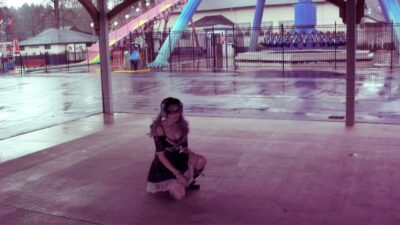
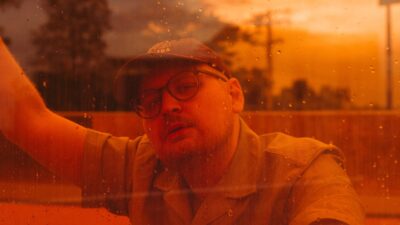
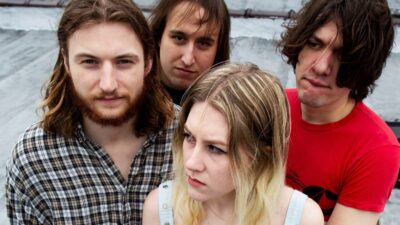
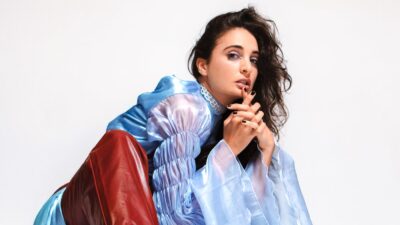
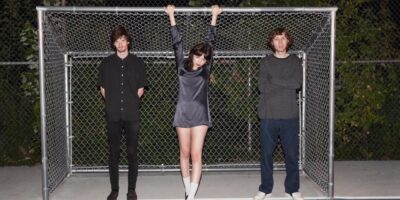

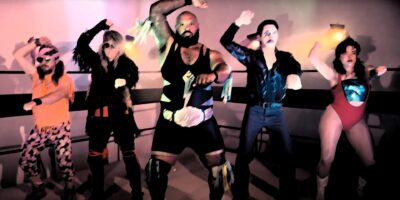
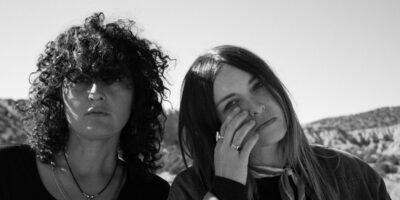
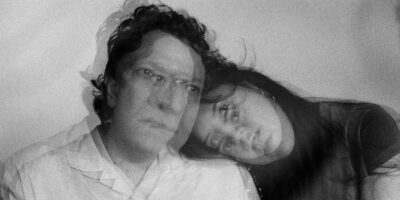
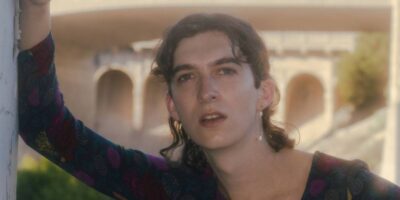
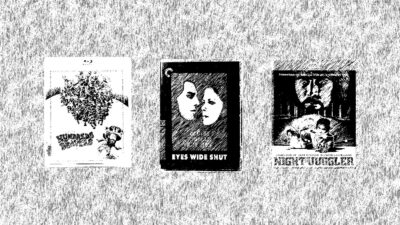

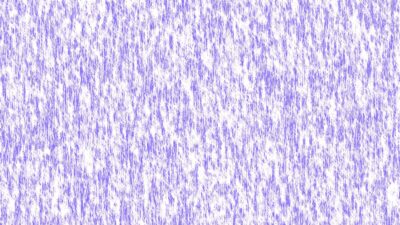
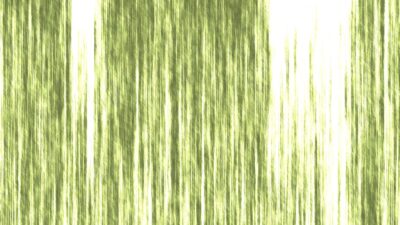
Comments